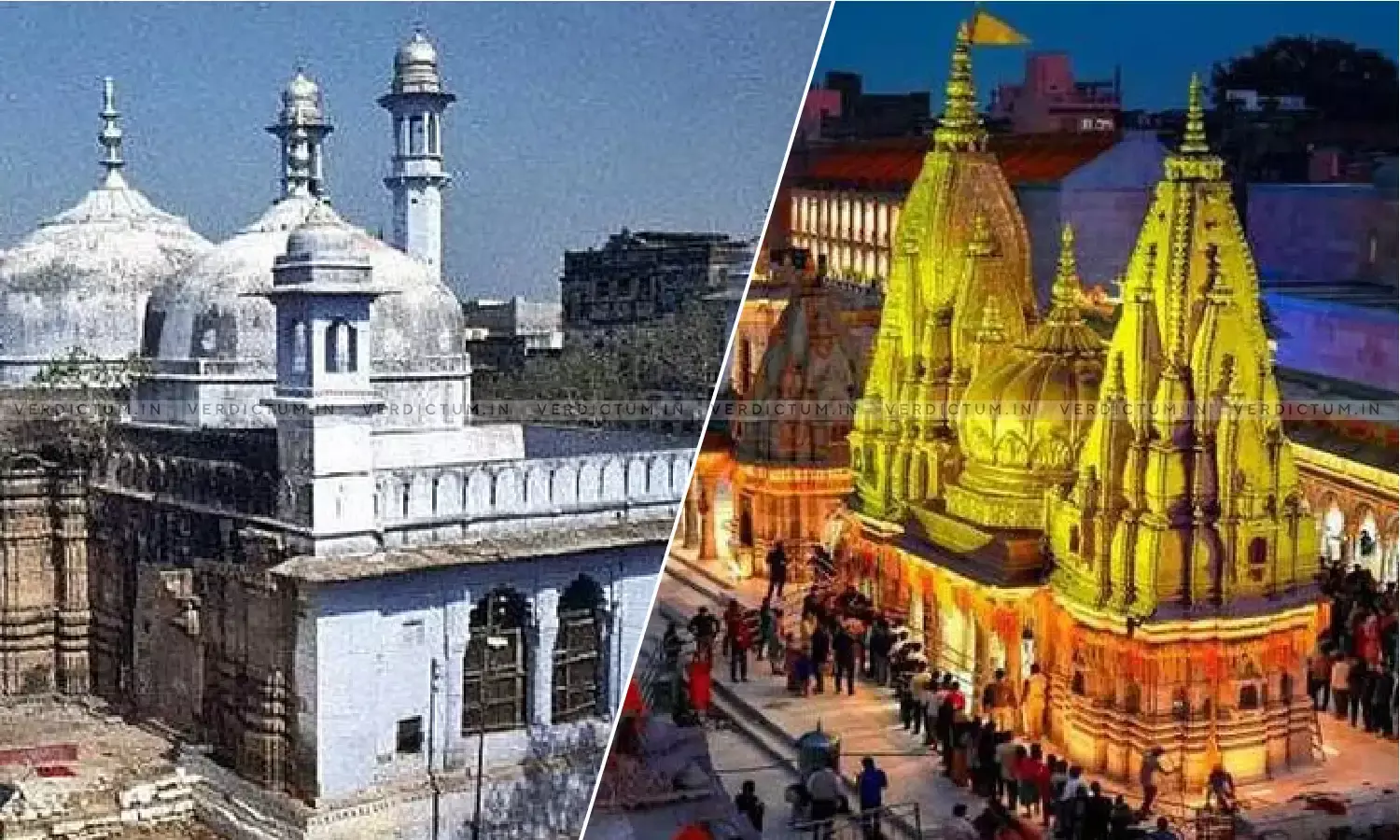Averments In Plaint That Deities In Gyanvapi Worshiped Till 1993, Places Of Worship Act Won't Apply- Varanasi Court's Order
Even if the idol is submerged in water, its pious purpose is not extinguished, the Court held.

The Varanasi District Judge Dr. Ajaya Krishna Vishvesha has dismissed the application of the Anjuman Islamia Masjid Committee Order 7 Rule 11 of CPC to dismiss as not maintainable, the Suit seeking the right to worship in the disputed site. The Court had pronounced its Order today.
"From the above mentioned averments made in the plaint, it is clear that the plaintiffs are claiming that till the year 1993, they were allowed to have Darshan and Pooja of Maa Sringar Gauri daily which exists within the property in question at the backside of Gyanvapi in northeast corner but thereafter the District Administration, Varanasi restricted their entry within the disputed property on all days and they were being allowed to worship within old temple only on 4th day of Chaitra in Vashantik Navaratra. Therefore, according to the plaintiffs, evenafter 15th August, 1947 they were worshiping Maa Sringar Gauri, Lord Ganesh and Lord Hanuman daily upto the year 1993. If this contention is proved then the suit is not barred by Section 4 of the Places of Worship (Special Provisions) Act, 1991. At this stage, the averments made in the plaint are to be seen and plaintiffs will have right to prove their averments by cogent evidence" the Court found.
The Court also held that the destruction of the idol does not result in the termination of the pious purpose and consequently the endowment. Even where the idol is destroyed, or the presence of the idol itself is intermittent or entirely absent, the legal personality created by the endowment continues to subsist, the Court held.
"In our country, idols are routinely submerged in water as a matter of religious practice. It cannot be said that the pious purpose is also extinguished due to such submersion", the Court held.
The Court also found that the Plaintiffs are only seeking to to worship visible and invisible deities with the contention that they worshipped there till the year 1993 and that the Plaintiffs are not claiming ownership over the disputed property. "They have also not filed the suit for declaration that the disputed property is a temple", the Court observed.
With respect to a decree cited by the Defendants that the property is a Waqf property, the Court noted that the Hindus were not parties in the suit and their application for impleadment in the suit was rejected. "Therefore, the decree passed in the above mentioned suit cannot have binding effect against the plaintiffs or the Hindu community", the Court held.
The Court held that the Plaintiffs have prayed to be allowed to worship the deities in the disputed property and such relief is not covered under Sections 33, 35, 47, 48, 51, 54, 61, 64, 67, 72, & 73 of the Waqf Act and hence rejected the argument of the Defendants that the suit is barred under Section 85 of the Waqf Act.
The Court also rejected the argument that the the suit is barred by the Uttar Pradesh Sri Kashi Vishwanath Temple Act, 1983.
The Suit was filed seeking a declaration that the Plaintiffs have a right to worship at a particular plot and that the Defendants be restrained from interfering with their rights and from demolishing or destroying any part of it.
In the application of Defendant under Order 7 Rule 11(d) of CPC, it was contended that the Gyanvapi Masjid was established on the said plot of land about 600 years back and that Muslims have been offering Namaz and Jumma without any interference. It was contended that the Suit was not maintainable on account of the Places of Worship (Special Provisions) Act, 1991 and since the Shri Kashi Vishwanath Act, 1983 provides that a Board of Trustees will be created which will look after Shri Kashi Vishwanath Mandir and all Gods and Goddesses in its compound.
It was also contended that in the plaint it has been mentioned that the building complex is under the control of Masajid Intezamia Committee and it is clear that the whole plaint relates to Gyanvapi Mosque and is a case of "clever drafting".
In reply to the application, the Plaintiffs contended that the plea of applicability of the Places of Worship Act has been raised only to prolong the proceedings and that there is no Mosque within the subject plot. It was contended that the entire property in question vests in the deity from time immemorial and that if any person forcibly, without any authority of law, offer Namaz within the property in question or at a particular place, the same cannot be called as Mosque.
"The Hindus are continuously performing pooja of Maa Gauri, Lord Hanuman, Lord Ganesha and other Visible and Invisible deities with rituals and are doing circumambulation (Parikrama) of the temple of Lord Visheshwar. The Hindus continued in the possession of cellar (Tehkhana) towards South and other parts of the demolished Temple with its ruins and Lord Adi Visheshwar is still in existence in its original shape in the western part of the old Temple at the property in question", the Plaintiffs had submitted.
Plaintiffs also submitted that only the averments made in the plaint can be considered under Order 7 Rule 11 and that there are clear averments that deities exist within the suit property since before August 15, 1947, and hence the 1991 Act will not apply. They contended that the Board of Trustees failed to perform its statutory duties by not taking any step for proper Darshan, Pooja and performance of rituals of the visible and invisible deities in the complex and hence a worshipper can institute a suit to protect the interest of the deity,
They had submitted that the alleged registration of the property as Waqf is illegal and void.
Click here to read/download Order

